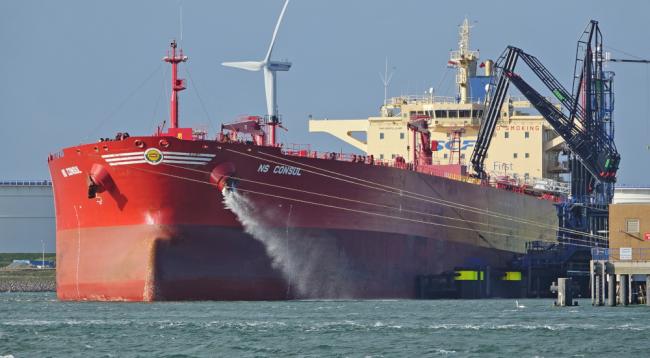Articles Menu

14 Sep 2018
Now that the Federal Court of Appeal has ruled on the Trans Mountain pipeline expansion, the National Energy Board should correct “serious mistakes” in its original 2016 report, says economist Robyn Allan.
Allan, former senior economist for the BC Central Credit Union and an intervenor in the hearings, said the errors include a dramatic understatement of the increased tanker traffic resulting from the pipeline and could lead to new legal challenges.
In a letter sent to the National Energy Board on Sept. 8, Allan challenges the report’s claim that tanker traffic from Kinder Morgan’s Burnaby terminal would increase 680 per cent.
The actual increase would be twice as much, she said.
The board based its finding on a determination that 60 tankers a year currently carried oil from the terminal, which would increase to 408 — almost eight per week — once the pipeline expansion is complete.
But public data shows that the terminal currently only receives about 30 tankers a year, Allan said.
The court overturned the federal government’s approval for the pipeline project in part because the NEB had failed to consider the impact of increased tanker traffic on endangered southern resident killer whales.
The Federal Court ruling also said consultation with First Nations was inadequate and needed to be redone.
It found the NEB “unjustifiably” excluded the impact of marine oil tanker traffic from its review. “The unjustified exclusion of marine shipping from the scope of the project led to successive, unacceptable deficiencies in the board’s report and recommendations.”
The tanker traffic issue will be critical if government asks the board to reconsider its impact in a new report, Allan says in her letter.
“The board cannot rely on any of the tanker traffic risk evidence filed with it because that evidence is not based on an accurate and reliable estimate of incremental tanker traffic.”
Allan said other errors in the original report could also be used to challenge any revised report from the NEB unless they’re corrected.
The errors exist because “the board made serious mistakes in the preparation of its report,” says Allan in her letter.
The original report also pegged the pipeline expansion cost at $5.5 billion, although Kinder Morgan had already revealed the cost had jumped to $6.8 billion prior to the end of the review.
“The capital cost estimate had serious implications for the project’s financial and commercial viability, its economic impact, and whether the shippers could exercise termination rights in their Firm Service Agreements (FSAs),” notes Allan’s letter.
The more it costs to build a pipeline, the higher tolls have to be for shippers. Higher tolls, in turn, affect the entire commercial feasibility of the project as well as any claimed benefits for the public.
“Nowhere in the report did the board alert cabinet to the potential negative economic impact increasing project cost would be expected to have on oil producers and projected revenue benefits tabled by Trans Mountain.” says Allan’s letter.
Since tabling of the NEB report in 2016, capital costs for the project rose again to $7.4 billion. Earlier this year Kinder Morgan estimated the costs to be $9.3 billion just prior to approving the sale of the existing pipeline and the expansion project to the Canadian government for $4.5 billion.
Allan suspects the final cost could be even higher and that escalating costs have nullified any economic benefits and existing shipper agreements.
Allan notes the board also claimed in its 2016 report that shippers contracted to fill the pipeline expansion “said that it is in the best interest of Canadians to maximize the prices received for Canadian crude oil production.”
Shippers never said any such thing during the Trans Mountain hearing, Allan says.
Evidence presented by 13 different shippers “at no time mentions Canadians, the public interest (best or otherwise) or that the project will maximize prices received for Canadian crude oil,” she says.
In fact the shippers only reported that the pipeline would diversify markets — not that it would increase prices for poor quality bitumen.
Allan asked the NEB to correct these and other errors in 2016, but the board said it would not respond because the matter was before the courts.
The Federal Court of Appeal overturned the government’s approval of the project last month in a unanimous decision, ruling the NEB report was so seriously flawed that the government couldn’t rely on it to approve construction of the pipeline expansion.
Allan added that the project’s economic prospects should also be reassessed given major changes in the global market including rising U.S. oil exports and the impact of new sulphur regulations for ship fuel on the pricing of Canadian heavy sour crude.
“I obviously believe it would be important to have an objective fact-based account of the project’s commercial and economic impact because it was never done at the original hearing and so much has changed in the last five years.”
[Top photo: Pipeline expansion would mean an increase in tanker traffic twice as great as NEB claimed, says Robyn Allan. Photo by kees torn, Creative Commons licensed.]